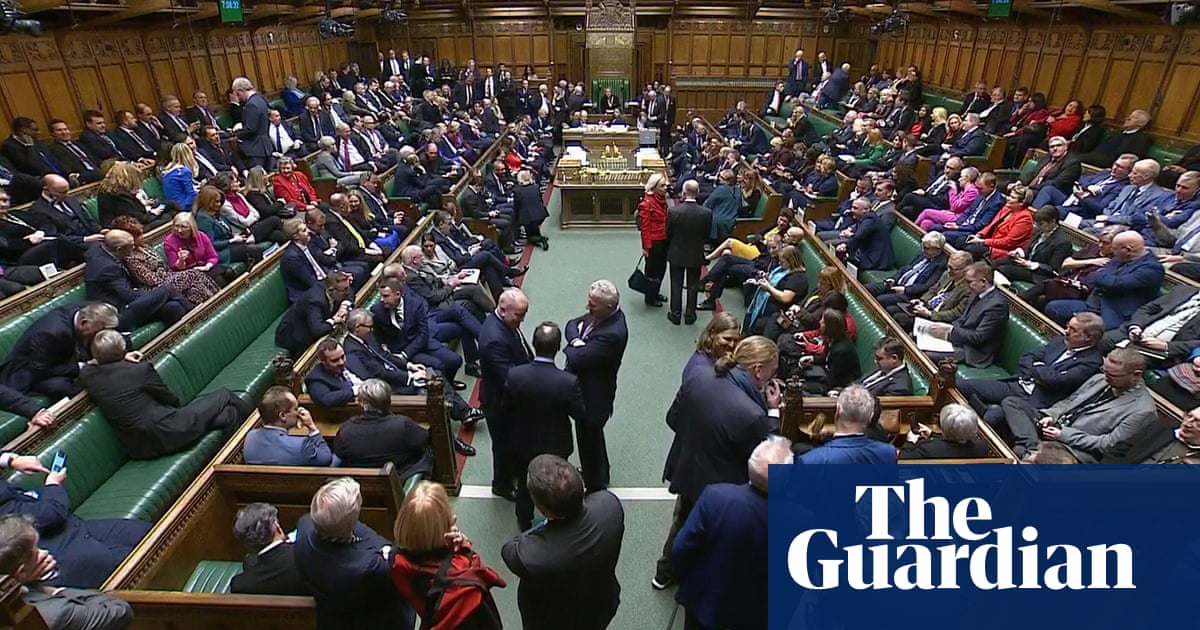
Late on Tuesday afternoon, a couple of dozen Conservative rightwingers hustled into the Wilson Room in Portcullis House, parliament’s modern extension.
There were two goals for the meeting. Ostensibly, it was to agree how they would vote in Tuesday night’s crunch vote on the Rwanda bill – a moment they knew could define Rishi Sunak’s premiership.
But there was also a second reason for meeting so close the vote itself: to make sure that after a frantic 36 hours of lobbying by the prime minister and his officials, the members of the loose affiliation of Tory MPs would not falter at the last and vote in favour of the bill.
Members emerged minutes before the voting began, with representatives from five major backbench groups – dubbed the five families after the New York mafia – announcing they would not support the bill.
The meeting, and the subsequent dramatic walk down to the chamber of the House of Commons to vote, capped an extraordinary two days in Westminster which saw internal Tory battles play out publicly in a way not seen since the Brexit wars of 2017-19.
In the end, enough Tory MPs abstained to give the prime minister a bloody nose without defeating the bill.
“This has been the Brexit battles all over again,” said one Conservative MP. “It’s the same arguments, the same groups, the same people leading them.”
The problems for the prime minister began almost as soon as he published the Rwanda bill, a piece of legislation designed to bypass legal objections to his flagship policy to deport asylum seekers to Rwanda.
The bill’s publication was promptly followed by the resignation of Sunak’s immigration minister Robert Jenrick, who was one of those to rebel on Tuesday night.
But the prime minister knew the fate of the bill rested not with Jenrick or even his former boss Suella Braverman, both of whom are now vying to be figureheads for the anti-immigration right.
Instead Sunak had to wait anxiously for the verdict of the “star chamber” – a panel of two MPs and two lawyers chaired by the veteran Eurosceptic Bill Cash, whose advice dozens of Tory MPs said they would follow in deciding whether to vote for the bill.
On Monday afternoon a small group of MPs from each of the major rightwing backbench groups had met in another conference room in Portcullis House to discuss the star chamber’s verdict and their response.
Those in the room say they were surprised at how definitive the star chamber advice was. The bill was “partial and incomplete”, according to a 10-page conclusion, and would not be fit for purpose without “very significant amendments”.
Mark Francois, the ebullient chair of the European Research Group and another veteran of the Brexit-era party battles, took those attending through the various options. Members could vote for the bill and push for amendments, or they could abstain or vote against and risk it collapsing altogether.
The option which won the most support from those there, according to people in the meeting, was to urge Sunak to withdraw the bill altogether and rework it with their input.
“The bill, because of the shape of it, because of its style, its legal structure would be quite difficult to amend,” Francois told the media afterwards. “It would be far better to withdraw the bill and come up with something which is much better written right from the word go.”
His words were a direct message to those in Downing Street: he and his allies were willing to vote against the bill, even if it meant this version collapsing.
Later that afternoon however, the other wing of the Tory party decided to do some organising of its own. Members of the One Nation caucus met on the same corridor as their colleagues had just hours earlier to agree their own warning to the prime minister: if he amended the bill in any major way, they would vote it down.
Sunak now faced a dilemma. He could bow to one group of his backbenchers, but not to both. Worse for the prime minister, the position of the rightwing MPs appeared to harden as the evening wore on.
“I was willing to vote for this bill and try to amend it,” one told the Guardian on Monday night. “But the more I think about it, the more I think it is unamendable.”
Early on Tuesday morning, over bacon sandwiches and pastries in Downing Street, just over a dozen MPs, mostly members of the rightwing New Conservatives group, laid out their demands.
Danny Kruger, the group’s co-chair, told Sunak he could pull the bill, as suggested by Francois, make clear in public he would make major amendments at a later stage, or risk a major rebellion. In response Sunak told them he was willing to make amendments, but only “within the framework of the bill”.
The reception in the room to Sunak’s message was mixed, according to one person there. But among other groups outside, already angry at not being invited to the breakfast, they went down like a cup of cold sick.
“Amendments within the framework of the bill are not going to be enough,” said one backbench MP. “The star chamber analysis made clear, we need a major rethink.”
As the afternoon progressed, the debate started in the Commons. Government whips were relieved that many of those who spoke against the bill indicated they were willing to vote for it.
Nick Fletcher, one of the New Conservatives to attend the Downing Street breakfast, told MPs in the afternoon: “We’ve got friends on this side of the house who want this bill stronger and I’m going to work with them … because we must make this work, we have to stop the boats.”
Sunak, however, was taking no chances, speaking to MPs in Downing Street one-on-one in an effort to pick off potential rebels.
Some on the Tory benches believed the “five families” never wanted to kill off the bill at all, but wanted to engineer enough of a rebellion to persuade the prime minister they had the power to vote it down if he did not amend it as they wanted.
Whether it was Sunak’s last-minute lobbying push that whittled down numbers, or whether it was always the intention of rightwing MPs to stop short of killing the bill altogether, that is exactly what happened.
Government sources say they expect the bill to come back to parliament for future debates in early January, when pressure from rightwingers will mount once more to amend the bill.
Sunak has the Christmas break to decide whether he wants to face them down once more, or this time turn against the centrists.












